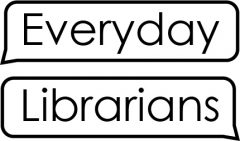JC Speaks Her Mind:
Whether you’ve been working in the library field for 30 years or 30 days, I’m sure you know by now that we don’t spend all day quietly reading books. Our work is people. As R. David Lankes said, we’re not just developing collections, we’re developing communities. I know a lot of librarians in all departments in all types of libraries are doing amazing things, and have been looking at making our libraries, collections, and conferences as inclusive as possible. However, one thing seems to have fallen through the cracks, and that is the way we talk about age.
I’m not going to point at any person or comment or post; I’m sure we’ve all seen grumbling about crusty old outdated librarians who should just hurry up and retire to make job openings for the young people. As I said, librarians are allies in diversity — when it comes to race. But just as you wouldn’t disparage someone because of their race or ethnicity, and I hope you wouldn’t disparage the abilities or worth of members of your community because they’re over a certain age, you really need to take a hard look how you talk about people in your own profession who are older (or younger — we’ll get to that).
Aside from being wrong, ageism is illegal, and hiring managers know this. A huge part of increasing the diversity of our profession is hiring managers who are deliberate about taking a careful look at all applicants and their qualifications, and are aware of the barriers that these applicants may face with race, ethnicity, age, lack of experience, and so much more. Good managers know the competencies that are needed to do the job, and understand that some things can be learned, but you cannot teach someone to like dealing with people — and of all the multitude of things that we do every day, dealing with people is the most important.
I think that last paragraph may be a bit too idealistic, but I’m going to leave it and discuss some of the barriers that can (and certainly are) put up for experienced applicants, such as saying that they’re not as energetic, not as tech savvy, and can’t relate to young people (in the case of youth librarians). These generalizations are dangerous, and that energy, tech skills, and ability to connect with the community are not tied to age, and it does everyone a disservice to assume so. If anything tech skills can correlate strongly with experience, and please don’t mistake social media presence for relevance. Being all over the internet does not make you relevant (and being on the internet doesn’t correlate with knowing what to do when a network crashes). Engaging with your patrons and colleagues does.
In a discussion with colleagues, it came up that ageism is completely illogical because all of us are growing older (unless you are some sort of immortal librarian; if that is the case please share in the comments below). However, that reminds me of the pleas for men to respect women because they’re somebody’s mom, daughter, sister, etc.
Sexism is bad. Racism is bad. Ageism is bad. Whether or not it directly affects you right now, it’s bad for all of us, and it’s time to knock it off.
SH Shares Her Perspective:
I’m an “experienced” librarian. I changed careers when I was 30 and have been a librarian for more than 24 years. I’ve been at my current library for more than 20 years and there’s an advantage to that, especially as a children’s librarian. The toddlers in my very first storytimes are now starting their careers. I’ve watched them grow up and we follow each other on social media. There’s connection and continuity with community.
I work with young women who have amazing ideas and the best part of our working relationship is that they listen to me when I have ideas. We incorporate them together. They bring skills to the job that I don’t have and I bring experience they don’t yet have. That’s the thing about life, if you don’t get older it means your dead. You might be the hot young thing in your field, but in 20 years another generation of librarians will come up and how you act now might determine how you act then. I suggest being open, accepting, and willing to work together.
